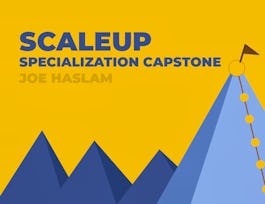You can't understand the world today if you don't understand corruption. Every day, we see high-level government officials resigning, governments changing, hundreds of thousands of people standing in squares, holding up signs, and often risking their lives to protest the corruption in the world. It's critically important to the health of our societies to understand what people are protesting against. We want to understand corruption. This course is designed to teach you about what corruption is, what causes corruption, the effects of corruption, and how to control corruption. We'll be talking about this from a global perspective using examples from all over the world. We'll also be talking about corruption from the perspective of countries, governments, businesses, citizens, and the people within these entities. At the end of this course, you'll have a better understanding of why the world is changing according to the path of corruption. If you're in a position to make changes within your respective entity, to make decisions about corruption, you'll be able to make better decisions.


Corruption
This course is part of Business Strategies for A Better World Specialization
Taught in English
Some content may not be translated

Instructor: Philip Nichols
17,167 already enrolled
Included with 
Course
(538 reviews)
97%
Details to know

Add to your LinkedIn profile
3 quizzes
Course
(538 reviews)
97%
See how employees at top companies are mastering in-demand skills

Build your subject-matter expertise
- Learn new concepts from industry experts
- Gain a foundational understanding of a subject or tool
- Develop job-relevant skills with hands-on projects
- Earn a shareable career certificate


Earn a career certificate
Add this credential to your LinkedIn profile, resume, or CV
Share it on social media and in your performance review

There are 4 modules in this course
Corruption affects us all and millions of people around the world protest against it every day. What is corruption? How do we know it when we see it? This module is designed to give you an understanding of both the definition and the key components of corruption. You’ll learn about the general and legal definitions of corruption, how to measure it using the Corruptions Perceptions Index, examine the history of corruption, and evaluate where corruption takes place in the world. You'll also learn three major theories that attempt to explain the current "Eruption in Corruption" that we are facing today. By the end of this module, you’ll be able to explain what corruption is, how it is measured, the costs of corruption, and how corruption spreads so that you can begin identifying and measuring corruption where it affects you.
What's included
4 videos1 reading1 quiz1 discussion prompt
In this module, you'll explore the extensive effects of corruption, including its economic, social and psychological costs. You'll learn how corruption leads to the informal creation of parallel institutions, such as loansharking and black markets, and see the role decision makers play in enabling the spread of corruption. You'll also learn how trust is jeopardized, and how this loss of trust inhibits economic and social development. You'll examine the social costs of corruption, including decreases in the quality of infrastructure and in environmental quality, increases in terrorism and infant mortality, and other threats to human security. At the end of this module, you'll be able to outline the comprehensive effects of corruption so that you can determine strategies for addressing them.
What's included
4 videos1 reading1 quiz
This module was designed to help you explore the ethics behind corruption through external and internal relationships. You'll learn about the time and monetary costs of corruption, perspectives on the benefits of bribery, and the characteristics of a strong ethical climate. You'll also learn how to identify indirect costs of corruption, including those that are easy to predict, like fines and settlements, and those which are harder to quantify, such as effects on an individual's reputation. At the end of this module, you'll be able to define corruption as part of a relationship, outline the costs of corruption on those relationships, and categorize the sanctions, both predictable and unpredictable, imposed on corrupt entities.
What's included
4 videos1 reading1 quiz
In this module, you will learn the main theories about control of corruption. You'll explore whether or not corruption can be controlled. Then, you'll examine the different ways corruption can be controlled: firms, industries, and polities (organized societies). You'll learn about assurance problems, platforms for exchange, and certification programs as some methods of control. You'll look at the steps organized societies have taken to control corruption, including the example of a country that used to have the cleanest government in the world. By the end of this course, you will be able to apply the principles you’ve learned by assessing the work of your peers in a Peer Review assignment. You'll create a Corruption Analysis in which you identify and analyze a real life incident of corruption that has occurred anywhere in the world over the past 12-18 months.
What's included
4 videos2 readings1 peer review
Instructor

Offered by
Recommended if you're interested in Governance and Society

University of Pennsylvania

IE Business School

Arizona State University

Howard University
Why people choose Coursera for their career




Learner reviews
Showing 3 of 538
538 reviews
- 5 stars
74.21%
- 4 stars
20.22%
- 3 stars
4.08%
- 2 stars
1.29%
- 1 star
0.18%

Open new doors with Coursera Plus
Unlimited access to 7,000+ world-class courses, hands-on projects, and job-ready certificate programs - all included in your subscription
Advance your career with an online degree
Earn a degree from world-class universities - 100% online
Join over 3,400 global companies that choose Coursera for Business
Upskill your employees to excel in the digital economy
Frequently asked questions
Access to lectures and assignments depends on your type of enrollment. If you take a course in audit mode, you will be able to see most course materials for free. To access graded assignments and to earn a Certificate, you will need to purchase the Certificate experience, during or after your audit. If you don't see the audit option:
The course may not offer an audit option. You can try a Free Trial instead, or apply for Financial Aid.
The course may offer 'Full Course, No Certificate' instead. This option lets you see all course materials, submit required assessments, and get a final grade. This also means that you will not be able to purchase a Certificate experience.
When you enroll in the course, you get access to all of the courses in the Specialization, and you earn a certificate when you complete the work. Your electronic Certificate will be added to your Accomplishments page - from there, you can print your Certificate or add it to your LinkedIn profile. If you only want to read and view the course content, you can audit the course for free.
If you subscribed, you get a 7-day free trial during which you can cancel at no penalty. After that, we don’t give refunds, but you can cancel your subscription at any time. See our full refund policy.

